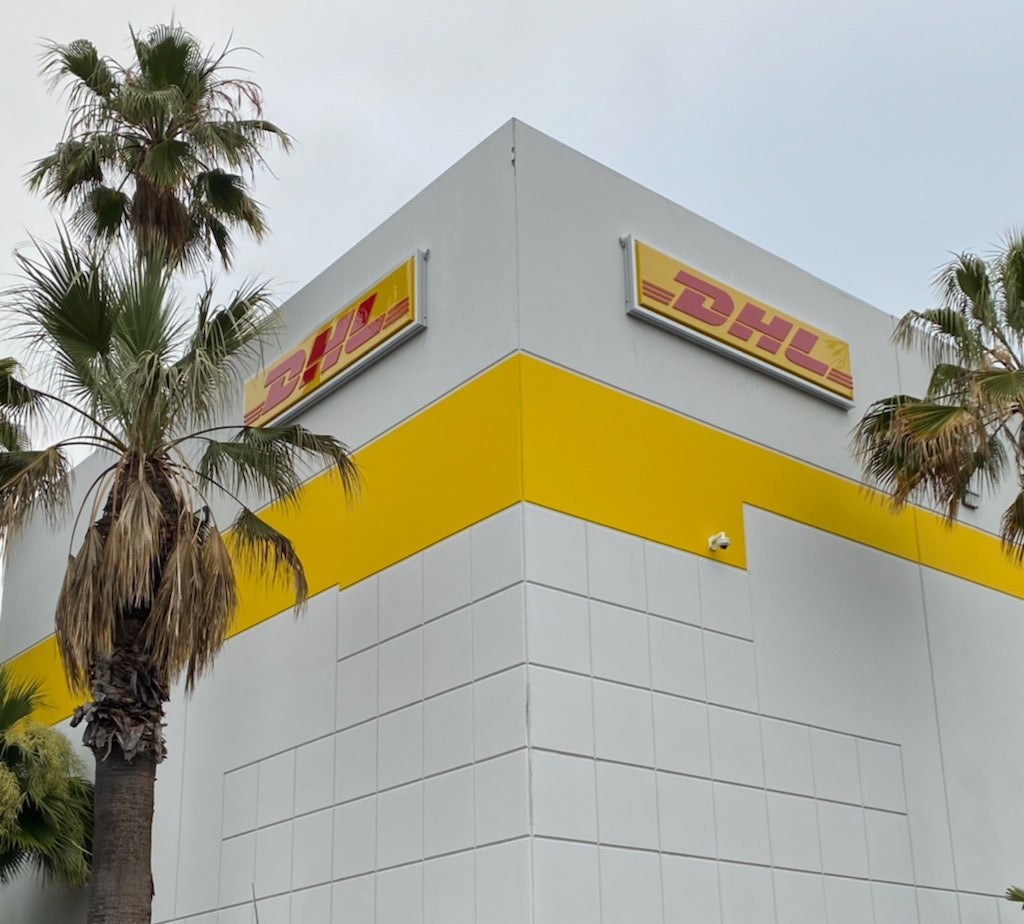WASHINGTON — DHL Express expects to open a new aircraft ramp and package sortation center in Atlanta by mid-October and announce its first major West Coast air hub in January to keep up with growing cargo volumes, said Mike Parra, CEO of the Americas.
Construction of the regional hub at Atlanta’s Hartsfield-Jackson International Airport has been slowed by COVID impacts on laborers, permitting challenges and steel shortages, management previously said. The updated start date slipped an extra month from September because of issues installing material-handling equipment, Parra told FreightWaves after speaking to the U.S. Chamber of Commerce’s Aerospace Summit here.
And the express division of logistics integrator Deutsche Post DHL (OTCUS: DPSGY) is poised to announce four months from now where it will locate a big West Coast cargo hub. Parra said final permitting details and other operational conditions necessary for approval from the host city are being worked out.
He declined to identify DHL’s final site selection, but CEO for the U.S. Greg Hewitt previously disclosed in an interview the company’s interest in establishing a Western air hub at Ontario International Airport in California, about 50 miles from downtown Los Angeles. Ontario is also home to large FedEx, UPS and Amazon Air operations.
Earlier this month, DHL finished relocating its local shipment facility in San Diego, double the size of the previous one, to a location near the airport. The $22 million investment increases shipment capacity and enables faster processing, speeding parcel deliveries.
The 86,000-square-foot warehouse was also improved with upgraded conveyors and other package-handling equipment, along with 85 dock doors for couriers — more than double the previous number of loading spaces, according to a DHL news release.
Thursday’s interview with Parra was on the same day that rival FedEx Corp. announced it was instituting a hiring freeze, closing FedEx Office locations, parking some aircraft, closing five corporate offices and taking other cost-cutting measures after its Express unit suffered a huge revenue shortfall because of economic conditions in Asia and service problems in Europe.
Deutsche Post has deep pockets to keep expanding the network. It posted record revenue of nearly $82 billion in 2021 and operating profit of $8 billion, a 65% year-over-year gain. Free cash flow topped $4 billion.

The addition of the Atlanta hub will enable more direct air service that helps speed inbound and outbound delivery times in the rapidly growing Southeast region. DHL has sufficient export volume from its Leipzig, Germany, and Hong Kong consolidation centers that it can now bypass the international hub at Cincinnati/Northern Kentucky International Airport and send shipments straight to Atlanta, streamlining network operations.
DHL’s investments are in response to sustained growth in both e-commerce, which relies heavily on air transport to meet customer expectations for fast delivery, and international trade.
Many pundits and companies said that the change in buying habits caused by the pandemic pulled forward e-commerce sales by three to five years. It’s more likely direct-to-consumer sales accelerated by a year as the pace of growth normalizes. The upward trajectory is still robust even without the COVID turbo boost, with online sales as a percentage of total retail sales expected to reach as much as 25% in 2025, compared to about 20% now.
Although e-commerce growth is reverting to the pre-pandemic mean, DHL is enjoying a bump in business-to-business demand and Parra said the goal is to retain those new customers with quality service.
“Where we have seen the growth is on the B2B side, and it’s more on the heavier weight per shipment” than a traditional parcel, Parra said in his public comments. Demand has come from businesses seeking to avoid lengthy delays associated with ocean shipping and businesses rebalancing their manufacturing footprint with sites in Southeast Asia or Latin America to avoid dependence on China, where government policies on COVID, power shortages and foreign policy have increased operating risk.
During the first quarter, DHL’s air express unit posted a 15.9% revenue gain to $6.7 billion, despite a year-over-year decline in volumes. The top-line gains were due to heavier-weighted shipments and the impact of fuel surcharges.
“We’ve also seen a shift into high-value shipments that are moving with our organization,” Parra said. “Now the challenge is making sure that we are keeping that new volume that’s come across” within the organization.
The biggest risk to trade growth is rising protectionism, especially efforts to dial back de minimis levels — lower the minimum value at which customs duties are imposed on imported goods — Parra said. Trade advocates and express carriers were successful last decade in getting Congress to raise the de minimis level to $800 on the basis that it stimulated cross-border trade in small shipments that typically make up B2C transactions.
“There’s pressure on de minimis in every country. I just came back from Colombia. And the new administration is looking for revenue. And one of the things that they’re looking at is the area of de minimis,” he elaborated in the interview.
Another concern is the increase in requests from customs authorities for more shipment data, which could be difficult for customers to provide. Parra said international couriers already provide huge amounts of advanced data.
Click here for more FreightWaves/American Shipper stories by Eric Kulisch.
RECOMMENDED READING:
DHL eyes major air hub expansion in US
Mercado Libre’s new S. American air cargo network mirrors Amazon model







